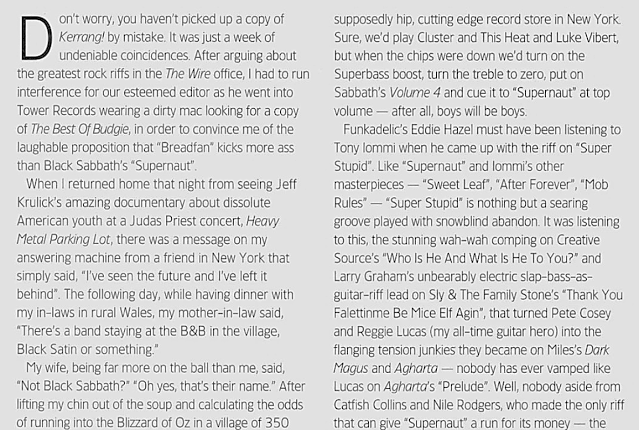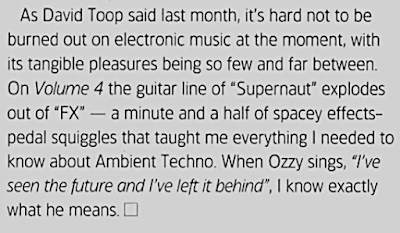Shocked and saddened to wake up yesterday and learn that Peter Shapiro has died.
I used to know Peter in the '90s and we worked together occasionally. He did some stuff for me at Spin (including a piece during which he explained what a dubplate is to an alt-rock readership and visits Music House in London to see the process of making one). And I contributed a piece on Krautrock for Modulations, an anthology of writings about electronic music that Peter edited.
His magnum opus is Turn The Beat Around: The Secret History of Disco, which is the definitive book on disco as an ever-expanding and mutating musical form.
The Peter Shapiro byline will be familiar to people who read this blog most likely from his contributions to The Wire, although he wrote for all kinds of places. He carried on contributing to Spin after my one-year experiment at being an editor came to its natural conclusion, and amongst other things wrote a memorable reported piece about an Air Guitar World Championship in Finland - he took up the gonzo challenge of living the story and entered the contest himself and actually came fourth!
Peter was a brilliant writer who pulled off the harder-than-it-looks double thing of being illuminating and funny at the same time.
Sadly but shrewdly he quit freelance music criticism and became a lawyer, eventually specializing in intellectual property rights and media.
Here's some more about Peter extracted from a tribute written by close friend and onetime fellow Spin contributor Mike Rubin:
"Peter was a native of Larchmont, NY.... His work appeared in URB, Vibe, Uncut, and The Times, The Wire, where he wrote cover stories on DJ/Rupture, Kool Keith, Kid 606, Talvin Singh, Anti-Pop Consortium, Quannum Projects, the "Illbient Alliance" (let's not hold that against him), A Guy Called Gerald, Coldcut, Stereolab, Jah Wobble, and Natacha Atlas. In addition to oodles of album reviews, he also frequently quizzed artists for the magazine's listening-test column "Invisible Jukebox," including Tom Moulton, Super_Collider, El-P, Mike Patton, Bill Laswell, Lemmy, Caetano Veloso, Alec Empire, and LTJ Bukem. A glance at the partial list of topics he wrote Wire articles on should give a sense of the dazzling breadth of his interests: artists like Larry Levan, Dabrye, Mike Ladd, Anticon, Fog, Playgroup, Q-Bert, Phil Cohran, Dan the Automator, Phoenicia, Dr. John, Mark the 45 King, Graham Haynes, Jungle Brothers, Prince Paul, Stacey Pullen, Omni Trio, Cristian Vogel, Larry Heard, LFO, & Emergency Broadcast Network; "Primer" listening guides to US hardcore punk, turntablism, James Brown, Fela Kuti, & P-Funk; genres like cosmic disco, Latin freestyle, mutant disco, psychedelic soul, and the new Americana; and topics like bootlegs, mixtapes, and machine beats.
"He penned several volumes of the Rough Guide series, including surveys of hip-hop, drum 'n' bass, soul, & R&B, before authoring his magnum opus: TURN THE BEAT AROUND: THE SECRET HISTORY OF DISCO (2005, Faber and Faber). He also edited MODULATIONS: A HISTORY OF ELECTRONIC MUSIC (2000, Caipirinha Productions). "
And here's a tribute from The Wire with much more on his involvement with the magazine - I forgot that he had been living for years in England, then moved from back to NYC in the late '90s. Also that he had worked on the staff of the Wire for a few years.
They mention a particular piece (below) which Peter did, kicking off their long-running Epiphanies column in January 1998, about rock riffs. It captures well a familiar arc - the writer pursuing the minutiae of electronic dance music culture (or some other ultra-hip, super-intricate area of music) and then tiring and turning off it, or just finding diminishing returns, and returning to the reliable thrills of dumb riffs. (Which could be find in dance music itself obviously - Big Beat) I remember going to a hipster bar in the Lower East Side regularly in the 2000s premised on this scenario, or at least that's what I assumed had happened. Instead of the trendy audio-trickly stuff that you'd expect and would have heard at similar bars in the late '90s, the audio fare was all classic rock riffola, James Gang and The Guess Who and "Jump Into the Fire" . It really felt to me like a recovery space for the jaded cool-hunter. I loved it - it was like when we would go on a car trip, renting a car and then starting out playing all the music we'd brought with us, CDs and mixtapes... but inevitably, after a day or so, we'd find ourselves tuning into the classic rock stations on the radio and sticking there. It suited the open road, just as in this bar, it suited drinking beer better than Kruder & Dorfmeister or Kompakt or whatever.
My own later versions of this "I've seen the future and I've left it behind" epiphany: "nifty groovers" and "brockism" (aka the hard rock continuum) and "my kind of rap"






Very sad. I remember reading Turn The Beat Around when it came out. It was possibly the first non cash-in book to chronicle the disco scene. I'd spent the previous twenty years cobbling together knowledge from album sleeve notes, the occasional magazine article etc. I always looked out for Peter's byline in my days of Wire reading. RIP.
ReplyDeleteSome of the cash-in ones are pretty good though. I like the Albert Goldman one and there is a thing that this guy Abe Peck pulled together for Rolling Stones books called Dancing Madness that is yes jumping on the bandwagon but really well done, informative, and actually captures the truth of disco that is left out of subsequent accounts - which is that it was a rather cheesy affair. The book is full of guides on how to dance the various dance styles - with the footsteps patterned out, and the dancing poses photographed. But there's lots about musicians and the sort of business aspects of clubs and being a deejay. Abe Peck was an interesting cat, he had been involved in the underground press in the 1960s. It sort of blows the myth that the rockist press ignored disco too.
Delete